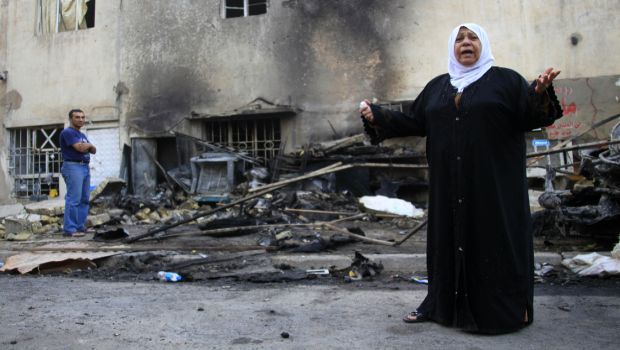
A woman grieves for her sister, who died in a bombing, while inspecting the site of the car bomb attack in Baghdad, Iraq, on Saturday, October 19, 2013. (AP Photo/Hadi Mizban)
Groups of people are killed in massive bombings, seemingly at random, the last of which we saw yesterday. But what is more frightening, indeed truly terrifying, is the hunting of individuals—a crime whose victims are innumerable. There are countless incidents where civilians have been killed and the government has failed to hold anyone to account. These include the murders of high-profile figures, such as radio talk show host Hadi Al-Mehdi in 2011, and Karbala football coach Mohammad Abbas, who was killed earlier this year. All too often, the rush of bullets from a gun with a silencer is the last thing an Iraqi hears.
Many countries have banned the hunting of wild animals, as well as woodland creatures, birds and marine wildlife. The United Kingdom banned fox hunting, an aristocratic activity that had been around for centuries, under pressure from animal rights activists and those wanting to protect the environment. In fact, if anyone tries to hurt so much as a waterbird in a public park in Europe, they have no defense.
If a duck happens to waddle past you in the UK, you must not even scare it because it is protected by the highest authorities and a law that must not be broken. Additionally, if your neighbor complains that you are neglecting your cat or dog, the police will arrive at your house within minutes and you will suddenly find yourself a suspect in a crime.
However, the people of Iraq do not have this level of protection. The number of people assassinated in my own family alone has reached eleven in the past eight years—although there have possibly been more, but we have never heard about it. I decided to count how many people were killed or assassinated in my family by the previous regime, and I found five, including my brother. The difference between then and now is that under Saddam we at least knew who the killers were: the state itself.
On May 5, 1970, I was studying in the public gardens when a huge procession passed by, headed by my father. I asked my uncle, Majid, what had happened and he replied, “Your uncle, Mohsen, has been killed and his body has been dumped on the bank of the marsh.” We went there and found three bullets in his neck, his keffiyeh (scarf) stuffed in his mouth and his hands tied behind his back.
Colonel Nazim Kazar, the head of the Iraq’s internal intelligence services, was found to have issued the order for his death. Kazar was the man synonymous with terror before Saddam Hussein appeared on our television screens. My uncle had been the victim of political tensions. The murder was a warning to my family because my cousin had been working against the government.
In those years, Iraqis knew that death only ever came at the hands of the state, which in some way comforted us. It is said, “When the cause is known, the shock goes away.” Earlier this year, I learned of the murder of the eleventh member of my family, Hassan Al-Khayoun. He wasn’t just my cousin, but also a friend and one of the people I long to see again.
The confusion and worry is visible on people’s faces: Who is the killer? Who will be next? This is why we call it the ‘hunting season.’ There is no authority to hold to account and no-one to turn to for help. Worst of all, you don’t even know the motive for murder.
The Iraqi government today has one million soldiers and police officers at its disposal, and yet has made no progress in protecting its people. It has the gall to call the day the Americans left “Loyalty Day” and even issues stamps to commemorate it, while shamelessly betraying both its people and the covenant it made with the people to protect them when it was elected.
This article was originally published in The Majalla.
All views expressed in this blog post are those of the author and do not necessarily represent the views of, and should not be attributed to, The Majalla magazine or Asharq Al-Awsat newspaper.
